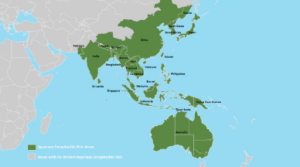General queries:
info@woodstockroadchemist.comNHS prescription queries:
woodstockrd.chemist@nhs.netGeneral queries:
info@woodstockroadchemist.comNHS prescription queries:
woodstockrd.chemist@nhs.netJapanese encephalitis is a rare but potentially serious infection transmitted by mosquito bites in certain parts of the world. If you’re planning to travel to areas where this virus is prevalent, understanding the risks and how to protect yourself is crucial. One of the most effective ways to prevent Japanese encephalitis is through vaccination.
Understanding Japanese Encephalitis
Japanese encephalitis is not found in the UK but is mostly prevalent in rural areas of Asia. The virus is spread through mosquito bites and is found in parts of India, China, Japan, South Korea, Indonesia, and Southeast Asia, including Thailand, Malaysia, and Vietnam.
Are You at Risk?
Travelers to rural areas in the affected regions are at a higher risk, especially if:

The image is sourced from CDC showing the High risk areas. https://www.cdc.gov/japanese-encephalitis/data-maps/index.html
Lowering Your Risk
To minimize your risk of contracting Japanese encephalitis, follow these preventive measures: Use insect repellent containing at least 50% DEET on exposed skin. Sleep under a mosquito net treated with insecticide. Wear long-sleeved tops, trousers, long skirts, socks, and shoes to protect your skin from mosquito bites. Seek advice from a travel vaccination clinic before you travel.
The Japanese Encephalitis Vaccine
The Japanese encephalitis vaccine is highly recommended if you are traveling to regions where the virus is found, especially if: You are staying for more than a month. You are staying in rural areas. You will be near rice fields, wetlands, or areas where pigs are kept.
Vaccine Details:

Symptoms of Japanese Encephalitis
Most people infected with Japanese encephalitis do not show symptoms. However, some may experience flu-like symptoms such as:
While these symptoms typically resolve on their own, in some cases, the infection can spread to the brain, causing severe symptoms such as:
Urgent Medical Advice
If you have recently traveled to an area where Japanese encephalitis is found and develop flu-like symptoms, seek urgent medical advice. Inform your healthcare provider about your recent travel and potential mosquito bites.
Immediate Action Required:
Call 999 if you or someone else experiences:
Treatment for Japanese Encephalitis
If diagnosed with Japanese encephalitis, hospitalization is required due to the potential severity of the disease. Treatments include medications to relieve symptoms, such as painkillers and steroids. Long-term complications can include paralysis, seizures, and loss of speech, emphasizing the importance of prevention through vaccination.
